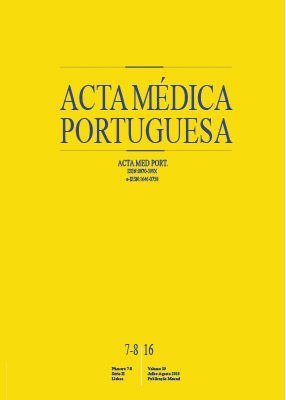Molecular Mechanisms for Adhesion and Colonization of Human Gastric Mucosa by Helicobacter pylori and its Clinical Implications
DOI:
https://doi.org/10.20344/amp.6651Keywords:
Adhesins, Bacterial, Carcinogenesis, Helicobacter Infections, Helicobacter pylori, Stomach Neoplasms, Virulence Factors.Abstract
Introduction: Helicobacter pylori infection is very prevalent worldwide and is associated with the progression of the gastriccarcinogenesis cascade, being one of the main risk factors for the development of gastric carcinoma. Several factors are determinant for the infection and for the development of gastric disease, including environmental factors, host genetic factors and virulence factors of the bacteria.
Material and Methods: In this review, we present an overview of the current knowledge on the determinants of the infection and on the recently described molecular mechanisms of Helicobacter pylori adhesion to the gastric mucosa, as well as its possible future therapeutic application.
Results: The adhesion of Helicobacter pylori to the gastric epithelium is critical for gastric pathogenesis, allowing bacterial access to nutrients and the action of bacterial virulence factors, promoting recurrence of the infection and the progression of the gastric carcinogenesis pathway.
Discussion: Eradication of Helicobacter pylori infection is the best preventive strategy available against gastric cancer, mainly if it is achieved before the development of pre-neoplastic lesions. The increase in antibiotics resistance, together with the eradication failures in some patients, has promoted the development of alternative treatments.
Conclusion: The new therapeutic strategies, focused on the molecular mechanism of Helicobacter pylori adhesion, are very promising; however, future studies are needed to evaluate its in vivo efficiency and toxicity.
Downloads
Downloads
Published
How to Cite
Issue
Section
License
All the articles published in the AMP are open access and comply with the requirements of funding agencies or academic institutions. The AMP is governed by the terms of the Creative Commons ‘Attribution – Non-Commercial Use - (CC-BY-NC)’ license, regarding the use by third parties.
It is the author’s responsibility to obtain approval for the reproduction of figures, tables, etc. from other publications.
Upon acceptance of an article for publication, the authors will be asked to complete the ICMJE “Copyright Liability and Copyright Sharing Statement “(http://www.actamedicaportuguesa.com/info/AMP-NormasPublicacao.pdf) and the “Declaration of Potential Conflicts of Interest” (http:// www.icmje.org/conflicts-of-interest). An e-mail will be sent to the corresponding author to acknowledge receipt of the manuscript.
After publication, the authors are authorised to make their articles available in repositories of their institutions of origin, as long as they always mention where they were published and according to the Creative Commons license.









